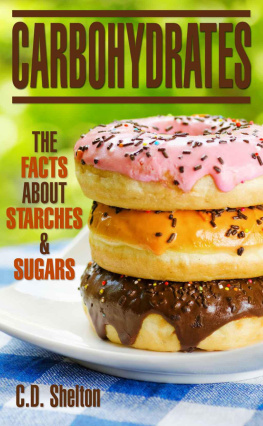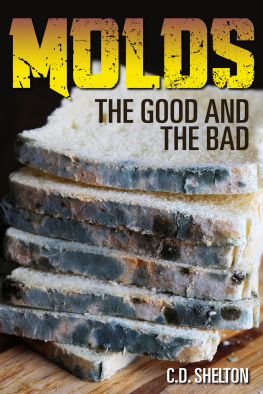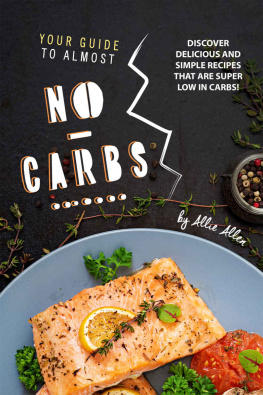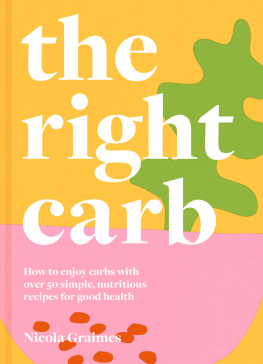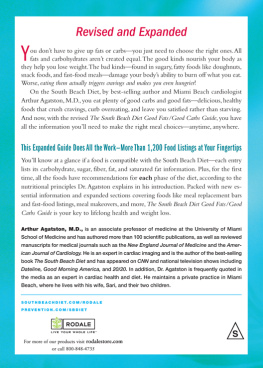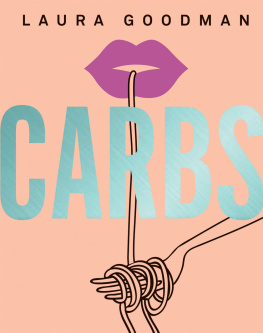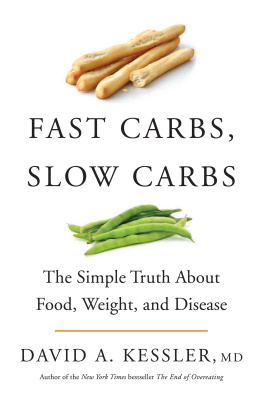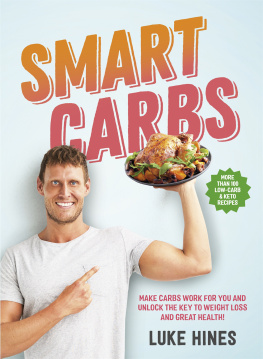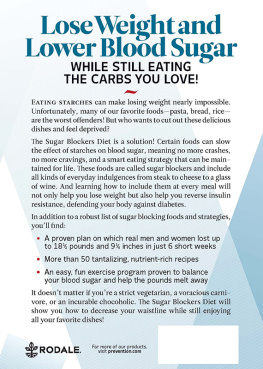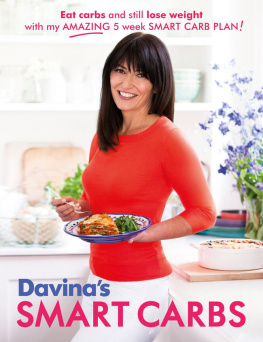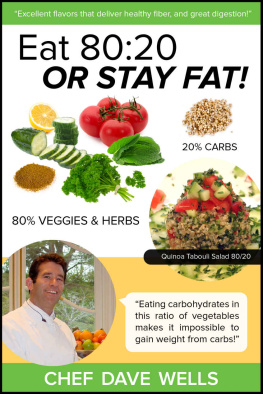Carbohydrates: The Facts About Starches & Sugars
By C.D. Shelton
2013 C.D. Shelton
Table of Contents
Preface
Abuse of carbohydrates, like abuse of so many other substances in our diet, can produce problems. However, understanding the role of a carbohydrate is the key to avoiding those problems.
Dont be misled by fad diets that cast the blame for our overweight condition solely on carbohydrates.
Carbohydrates provide our body with the fuel it prefers and needs for all of our physical activities. Carbs are an important part of a healthy diet, but like other food categories, some carbohydrates are better for you than others.
This short ebook will examine problem carbs and discuss carbs that might be a better choice for your dietary consideration, as well as the role carbs play in sugar cravings and artificial sweeteners.
Carbohydrates Defined
A Carbohydrate is an organic compound that contains three types of elements, carbon, hydrogen and oxygen. The ratio of hydrogen to oxygen is 2:1 the same as in water. Hence the name carbo.hydrate (hydrate meaning water).
Carbohydrates are categorized into three groups, monosaccharide (glucose, fructose and galactose). These simple sugars can be chemically combined by dehydration synthesis into double sugars called disaccharides (sucrose, maltose and lactose). The final polysaccharide is created again by dehydration synthesis (starch, glycogen and cellulose).
Both glycogen and starch are referred to as polysaccharides (poly=many and saccharides=sugars). Double sugars, called disaccharides, are also used to store sugar by plants.
Carbs perform a variety of functions in the living organism. Complex carbohydrates have a storage role. These large complex molecules (glycogen) can be fabricated in the liver and stored and then broken down as an immediate source of glucose (simple sugar) when the body requires energy. Plants store excess sugar in the form of another complex molecule called starch.
Nutrition
Foods high in carbohydrates include fruits, sweets, soft drinks, breads, pastas, potatoes, bran, rice, and cereals. Carbohydrates are a common source of energy in living organisms, however no one carbohydrate is an essential nutrient in humans.
Good Carbs & Bad Carbs
All carbs provide the body with fuel needed for physical activity. The big question in using carbs is HowQuickly They Enter the Bloodstream? If the carbohydrate is a simple sugar, requiring no digestion, that means it can enter into the bloodstream quickly and create a sugar spike in your blood/sugar ratio. The body could respond by quickly removing that extra sugar and storing it as fat.
So weight can be gained by consuming simple sugars, unless you are exercising and the sugar is being used as an energy source. In this case, simple sugar, those not requiring digestion, could be viewed as Bad Carbs because they represent an empty calorie source and lead to the possibility of weight gain.
The Bottom Line
The very best source of carbohydrates is from whole grains (the less processed the better), vegetables, fruits and beans. All of these provide us with needed energy and because they have not been processed, they provide us with a full spectrum of vitamins and minerals. They would be considered the Good Carbs.
Easily digested and refined carbohydrates from white bread, white rice and other refined grains, pastries, sugared sodas and highly processed foods can easily contribute to weight gain, interfere with any weight loss plans, promote diabetes and heart disease. These would be considered the Bad Carbs.
Some Sources of Good Carbs
The following represents five tips for adding the Good Carbs to your diet:
1) Breakfast is an important meal and should not be skipped, leaving you open to the temptation of some Bad Carbs like those found in pastries. Try a hot cereal in the morning, something like oatmeal laced with fruit of your choice and a hand full of nuts. Avoid dry cereals that have a sugar content above 6 grams per serving (read the label).
2) Use whole grain breads for lunch or snacks. Read the food label, if whole wheat is listed as the first ingredient that would be a good choice. Look for labels that read 100% whole wheat.
3) Reduce your potato consumption by looking for substitutes as a meal companion, try brown rice or whole wheat pasta.
4) Choose whole fruit rather than fruit juice. A whole orange has two times the fiber of a 12 ounce glass of orange juice. By choosing the whole orange you reduce the sugar intake and increase your needed fiber intake.
5) Beans are an excellent source of complex carbohydrates. They are also rich in fiber and protein, both needed nutritional components.
Some Sources of Bad Carbs
Your body uses carbohydrates to make glucose which is the fuel your cells need for energy. The glucose keeps everything working, so we need it. Trouble arises if we get too much of the needed glucose all at one time. The liver can store some of the extra sugar as glycogen, but when glycogen storage is full, the body has no choice but to store the extra sugar as fat. As the old adage goes, referring to sugar, A moment on the lips, forever on the hips.
The truth is, once the extra sugar is stored as fat, it is difficult to remove. So your best strategy is never give the body a sugar rush, thats when fat is created and stored. The definition of a Bad Carb is one that creates that sugar rush. Candies, cookies, ice cream and pastries contain the carbs that should be avoided.
Healthier foods, higher in carbohydrates, include those that have complex Carbs and fiber (whole grains, fruits and vegetables).
Complex Carbohydrates
Complex carbohydrates are the Good Guys. They include complex carbohydrates, sugars and starches that may also contain dietary fiber.
Starches and complex sugars must be broken down (digestion) before they enter the blood stream by absorption. This process dramatically slows down availability of glucose to the blood stream. This is the condition most favorable to you (unless youre exercising and need the glucose). The following foods have the characteristics outlined above:
Rich in complex carbohydrates:
*Oatmeal
*Oat Bran
*Nuts and seeds
*Most fruits (e.g., strawberries, blueberries, pears, apples)
*Most vegetables
*Beans and peas
Rich in carbohydrates and fiber:
*Oatmeal
*Whole wheat bread
*Barley
*Brown rice
*Couscous
*Bulgur or whole grain cereals
*Wheat bran
*Seeds
*Most vegetables
*Fruits
Which of the above list carbohydrates are best? THEY ALL ARE! The above is a listing of the GOOD CARBS and should be part of any healthy diet.
Fiber is a dietary requirement. It is recommended a person get 14 grams of fiber for every 1000 calories consumed. On a typical 2,000 calorie diet a person would need 28 grams per day.
Hyperactivity & Carbs
Simple sugars provide an immediate energy source. The energy in one gram of carbohydrate is rated in calories. The calories in one gram of carbohydrate is four. One calorie (K Calorie) is the quantity of energy required to raise 1000 milliliters of water (liter) one degree centigrade.
Some people claim that sugar (such as sucrose), artificial sweeteners (such as aspartame) and artificial flavors and colors cause hyperactivity. Hyperactivity means excess movement, impulsiveness, and decreased attention span and maybe other behavioral problems in children. Some people believe that children who have any of these symptoms of hyperactivity should not be given sweets, artificial flavors or colors.
There may be some truth in that belief. Refined sugars do enter the blood stream quickly and a number of studies have shown a relationship between hyperactivity and artificial food colorings and flavors.
Next page
